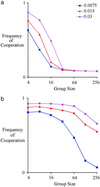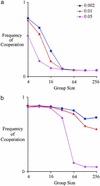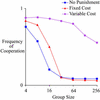The evolution of altruistic punishment - PubMed (original) (raw)
The evolution of altruistic punishment
Robert Boyd et al. Proc Natl Acad Sci U S A. 2003.
Abstract
Both laboratory and field data suggest that people punish noncooperators even in one-shot interactions. Although such "altruistic punishment" may explain the high levels of cooperation in human societies, it creates an evolutionary puzzle: existing models suggest that altruistic cooperation among nonrelatives is evolutionarily stable only in small groups. Thus, applying such models to the evolution of altruistic punishment leads to the prediction that people will not incur costs to punish others to provide benefits to large groups of nonrelatives. However, here we show that an important asymmetry between altruistic cooperation and altruistic punishment allows altruistic punishment to evolve in populations engaged in one-time, anonymous interactions. This process allows both altruistic punishment and altruistic cooperation to be maintained even when groups are large and other parameter values approximate conditions that characterize cultural evolution in the small-scale societies in which humans lived for most of our prehistory.
Figures
Figure 1
The evolution of cooperation is strongly affected by the presence of punishment. (a) The long run average frequency of cooperation (i.e., the sum of the frequencies of contributors and punishers) as a function of group size when there is no punishment (p = k = 0) for three different conflict rates, 0.075, 0.015, and 0.003. Group selection is ineffective unless groups are quite small. (b) When there is punishment (p = 0.8, k = 0.2), group selection can maintain cooperation in substantially larger groups.
Figure 2
The evolution of cooperation is strongly affected by rate of mixing between groups. (a) The long run average frequency of cooperation (i.e., the sum of the frequencies of contributors and punishers) as a function of group size when there is no punishment (p = k = 0) for three mixing rates, 0.002, 0.01, and 0.05. Group selection is ineffective unless groups are quite small. (b) When there is punishment (p = 0.8, k = 0.2), group selection can maintain cooperation in larger groups for all rates of mixing. However, at higher rates of mixing, cooperation does not persist in the largest groups.
Figure 3
The evolution of cooperation is sensitive to the cost of being punished (p). Here we plot the long run average frequency of cooperation with the base case cost of being punished (p = 0.8) and with a lower value of p. Lower values of p result in much lower levels of cooperation.
Figure 4
Punishment does not aid in the evolution of cooperation when the costs born by punishers are fixed, independent of the number of defectors in the group. Here we plot the long run average frequency of cooperation when the costs of punishing are proportional to the frequency of defectors (variable cost), fixed at a constant cost equal to the cost of cooperating (c), and when there is no punishment.
Similar articles
- Altruistic punishment and the origin of cooperation.
Fowler JH. Fowler JH. Proc Natl Acad Sci U S A. 2005 May 10;102(19):7047-9. doi: 10.1073/pnas.0500938102. Epub 2005 Apr 27. Proc Natl Acad Sci U S A. 2005. PMID: 15857950 Free PMC article. - Punishment leads to cooperative behavior in structured societies.
Shutters ST. Shutters ST. Evol Comput. 2012 Summer;20(2):301-19. doi: 10.1162/EVCO_a_00062. Epub 2012 Feb 24. Evol Comput. 2012. PMID: 22171813 - Altruistic punishment in humans.
Fehr E, Gächter S. Fehr E, et al. Nature. 2002 Jan 10;415(6868):137-40. doi: 10.1038/415137a. Nature. 2002. PMID: 11805825 - Neural components of altruistic punishment.
Du E, Chang SW. Du E, et al. Front Neurosci. 2015 Feb 9;9:26. doi: 10.3389/fnins.2015.00026. eCollection 2015. Front Neurosci. 2015. PMID: 25709565 Free PMC article. Review. - Human altruism: economic, neural, and evolutionary perspectives.
Fehr E, Rockenbach B. Fehr E, et al. Curr Opin Neurobiol. 2004 Dec;14(6):784-90. doi: 10.1016/j.conb.2004.10.007. Curr Opin Neurobiol. 2004. PMID: 15582384 Review.
Cited by
- Do social networks influence small-scale fishermen's enforcement of sea tenure?
Stevens K, Frank KA, Kramer DB. Stevens K, et al. PLoS One. 2015 Mar 30;10(3):e0121431. doi: 10.1371/journal.pone.0121431. eCollection 2015. PLoS One. 2015. PMID: 25822364 Free PMC article. - Rejection of unfair offers in the ultimatum game is no evidence of strong reciprocity.
Yamagishi T, Horita Y, Mifune N, Hashimoto H, Li Y, Shinada M, Miura A, Inukai K, Takagishi H, Simunovic D. Yamagishi T, et al. Proc Natl Acad Sci U S A. 2012 Dec 11;109(50):20364-8. doi: 10.1073/pnas.1212126109. Epub 2012 Nov 27. Proc Natl Acad Sci U S A. 2012. PMID: 23188801 Free PMC article. - To punish or to leave: distinct cognitive processes underlie partner control and partner choice behaviors.
Martin JW, Cushman F. Martin JW, et al. PLoS One. 2015 Apr 27;10(4):e0125193. doi: 10.1371/journal.pone.0125193. eCollection 2015. PLoS One. 2015. PMID: 25915550 Free PMC article. - The co-evolution of fairness preferences and costly punishment.
Hetzer M, Sornette D. Hetzer M, et al. PLoS One. 2013;8(3):e54308. doi: 10.1371/journal.pone.0054308. Epub 2013 Mar 20. PLoS One. 2013. PMID: 23526926 Free PMC article. - Evidence of direct and indirect reciprocity in network-structured economic games.
Redhead D, Gervais M, Kajokaite K, Koster J, Hurtado Manyoma A, Hurtado Manyoma D, McElreath R, Ross CT. Redhead D, et al. Commun Psychol. 2024 May 22;2(1):44. doi: 10.1038/s44271-024-00098-1. Commun Psychol. 2024. PMID: 39242753 Free PMC article.
References
- Axelrod R, Hamilton W D. Science. 1981;211:1390–1396. - PubMed
- Trivers R L. Q Rev Biol. 1971;46:35–57.
- Clutton-Brock T, Parker G A. Nature. 1995;373:209–216. - PubMed
- Boyd R, Richerson P J. J Theor Biol. 1988;132:337–356. - PubMed
- Sober E, Wilson D S. Unto Others: The Evolution and Psychology of Unselfish Behavior. Cambridge, MA: Harvard Univ. Press; 1998. - PubMed
LinkOut - more resources
Full Text Sources



